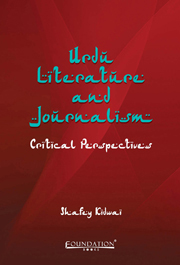Book contents
- Frontmatter
- Dedication
- Contents
- Preface
- Introduction
- Acknowledgements
- 1 Post-Independence Urdu Short Story
- 2 Post-Partition Urdu Poetry
- 3 Structuralism and Post-structuralism in Urdu Criticism
- 4 Jayant Parmar
- 5 Firaq as a Critic
- 6 Ghalib Criticism
- 7 Literature, Culture and Social Consciousness
- 8 The Influence of Tagore on Urdu Literature
- 9 Early Journalistic Endeavours of Sir Syed Ahmad Khan
- 10 Pioneering the First Urdu Book on Journalism
- 11 The Contribution of Urdu Journalists to the First War of Independence
- 12 Abul Kalam Azad's Journalistic Conquests
- Index
2 - Post-Partition Urdu Poetry
The Indian Panorama
Published online by Cambridge University Press: 05 October 2014
- Frontmatter
- Dedication
- Contents
- Preface
- Introduction
- Acknowledgements
- 1 Post-Independence Urdu Short Story
- 2 Post-Partition Urdu Poetry
- 3 Structuralism and Post-structuralism in Urdu Criticism
- 4 Jayant Parmar
- 5 Firaq as a Critic
- 6 Ghalib Criticism
- 7 Literature, Culture and Social Consciousness
- 8 The Influence of Tagore on Urdu Literature
- 9 Early Journalistic Endeavours of Sir Syed Ahmad Khan
- 10 Pioneering the First Urdu Book on Journalism
- 11 The Contribution of Urdu Journalists to the First War of Independence
- 12 Abul Kalam Azad's Journalistic Conquests
- Index
Summary
Urdu poetry, since its inception, has tried to capture completely, the conscious life, the cognitive life, life beyond the mundane realities, the life of desire and the anguish involved in extracting the meaning of the mundane realities that are ostensibly uncanny, macabre and sordid. Its most-longed-for genre, the Ghazal, drawing its sustenance from the sentimental and metaphysical notion of love, apocalyptic hyperbole, tenacious and multi-sensory imagery, still tweaks the curiosity of those who have panache for good poetry.
The creative dexterity and aesthetic sensibility of some great Urdu poets such as Mir, Ghalib, Anees, Iqbal, N.M. Rashid, Meeraji, Faiz, Firaq Gorakhpuri, Nasir Kazmi, Akhtar ul Iman, Faraz and Shahryar, still receives widespread adulation. Their frequent and judicious juxtaposition of solitariness and heterogeneity is both awe-inspiring and ecstatic in effect.
The Ghazal's immense popularity aside, Urdu poetry's tendency for sentimental exoticism that betrays a kind of rejoicing in pain, has prompted some critics to tear its self-collapsing and clichéd diction apart. They describe it as a body of atonal and mushy writing, bordering on a kitsch that harps on the themes regurgitated by the eminent Persian and Arabic poets of the yore.
Despite this existent polemic in Urdu poetry, if various genres of the post-Independence breed of the poetry are sifted at once, both at the level of content and form, one will be able to see how Urdu poetry, as a whole, has broken away from the grotesque subversion of the normative requirements of neo-classical poetry.
- Type
- Chapter
- Information
- Urdu Literature and JournalismCritical Perspectives, pp. 34 - 64Publisher: Foundation BooksPrint publication year: 2014

